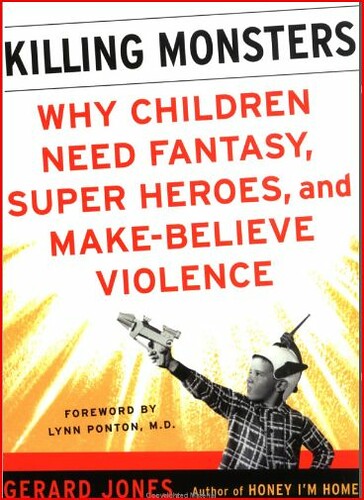Trending
Opinion: How will Project 2025 impact game developers?
The Heritage Foundation's manifesto for the possible next administration could do great harm to many, including large portions of the game development community.
Don't read this book. I'll tell you everything you need to know.

Someone asked me if I would recommend that they read this book. I swiftly said "No." That doesn't mean I don't think that the book was worthwhile. I'm very glad that this book exists, I just wish that no one actually had to read it. Luckily for you, I jumped on that grenade and read the book -- so you don't have to!
The subtitle of the book is "Why Children Need Fantasy, Super Heroes and Make-Believe Violence." The author's purpose is to justify the use of certain kinds of violence within popular entertainment, and to explain why kids can't get enough of this kind of entertainment, despite the popular claim that it is damaging to children.

The premise of the book is stated quite well on page 12, when the author, Gerard Jones, points out "when something troubles them [children], they have to play with it until it feels safer." There are a few subtle variations of this point, but basically the idea is that children feel powerless and they self-medicate with power fantasies.
It's an idea I'm fond of, and one I hope is true. Unfortunately there are about 215 more pages to fill, so this premise is restated many times over.
As I said, I have a lot of sympathy for the ideas in this book, but please allow me to play devil's advocate for a moment. Gerard Jones is not a psychologist. In fact he is a writer of comic books (conflict of interest?) who has held many workshops for children to create their own comics. That is where he gets most of the stories he relates in the book. The stories go like this: Jimmy was a troubled child with hippy parents, but then they let him have a toy gun and now he's fine. There are probably 20 of these stories in the book. Jones spends a lot of time dismissing the results of scientific research without citing any research with the opposite conclusion (which there might not have been in 2002 when the book was published). Then he strings together a number of anecdotes, presumably hoping that they will magically coalesce into data, like so many zords forming a megazord. They do not.
Now allow me to give you some quotes from the book if you'd like to be able to cite it without actually reading it:
Jones speaking about his mother: "...she saw my love of superheroes as coming from within me, not as something that had been imposed on me by the entertainment industry" p. 16
"Adult anxieties about the effects of entertainment are sometimes the real causes of the very effects that we fear most." p. 16
"Taking away the entertainment that enables them to grapple with reality won't make their reality better but may only leave them defenseless against it." p. 103
"'The games make me feel stronger' wrote one [child]. 'I think me feeling stronger is what they don't want.'" p. 217
I do not recommend this book, but I recommend the idea of this book. I hope you'll tell your friends about it.
Read more about:
BlogsYou May Also Like